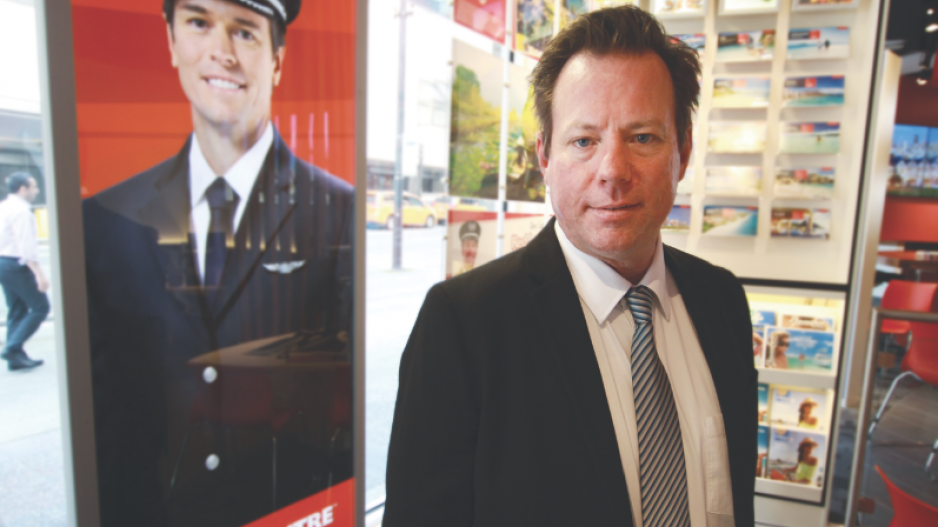John Beauvais considers himself a citizen of the world.
Freshly back from trips to Brazil, Croatia and South Africa, the new president of Flight Centre Canada (FCC) travels extensively.
Many trips involve meeting counterparts from the other 89 countries in which Brisbane, Australia-based Flight Centre Travel Group Ltd. (ASX:FLT) has partnerships. He also adds side trips to his business travel and plans sojourns when on vacation.
Travelling, to Beauvais, is not frivolous. And his company’s role as one of the world’s largest travel agencies is not inconsequential.
“What we do matters,” Beauvais told Business in Vancouver during an interview at Flight Centre Canada’s head office in Vancouver.
“People who are well travelled have a better understanding of the world and make the world a better place. They don’t fear the unknown as much.”
Facilitating travel, whether it is for executives, honeymooners, backpackers or others, has value because it fosters understanding and acceptance of other cultures, therefore contributing to world peace, he explained.
“The corporate customers we serve address every affliction that impacts the human species,” he said. “We’re an extension of that.”
Beauvais was groomed for the travel business from Day 1.
His father, Edward Beauvais, helped found and was CEO of America West Airlines, which operated for decades before merging in 2005 with US Airways, which in 2013 merged with American Airlines.
Born in Las Vegas but raised in San Francisco, the now-51-year-old Beauvais moved to Phoenix with his parents when he was 15 years old.
After completing a business degree at Arizona State University, he went to work at his father’s airline.
He was not given special treatment or gratuitous promotions, however, and left after a few years of holding what he calls “junior positions.”
He spent a couple of years working for the Dallas/Fort Worth International Airport in a post in which he cultivated relationships with airline executives. He left to work for an Australian company in his first managerial role.
Instead of heading Down Under, however, he managed North American sales and marketing for Rail Australia.
Though Beauvais was based in Los Angeles, he got to know the Australian travel industry well from interacting with travel agents and other industry insiders.
So it was a natural progression to leave Rail Australia in 2004 to join Flight Centre North America (FCNA) as vice-president of supplier relations, a role in which he again developed close working relationships with airline executives.
Two years later, he left Los Angeles to move to the company’s Vancouver head office in 2006. He was part of the team that helped expand FCNA’s U.S. operations by buying agencies such as Chicago’s Bannockburn chain.
He moved to New York City in early 2008, when FCNA was buying Liberty Travel, one of the U.S.’s largest and best-known travel agency chains.
At that time, the breakup of FCNA into smaller parts appeared imminent. The Vancouver-based subsidiary was getting large with a disproportionate number of its agencies based in the U.S.
Flight Centre Canada launched with a Vancouver head office while a new Flight Centre subsidiary, known as Liberty Travel USA, was created and headquartered in New Jersey. Beauvais made what he calls the “lifestyle decision” to live nearby, in Manhattan. In reality, however, he was on the road most of the time in his role as the company’s president of U.S. corporate brands.
“It’s good to be back in Vancouver,” he told BIV about a month after his April appointment to head Flight Centre’s Canadian operations, which are on track to generate US$1.15 billion in sales in the year that ends June 30.
Beauvais expects most growth at FCC to come from its core leisure and corporate divisions.
FCC generates about 65% of its revenue from leisure travel and about 35% from corporate travel, although new divisions are poised to add new revenue streams.
The biggest change will come when the 1,650-employee FCC connects with its parent company’s cievents.com – an event production division that operates in Australia, the U.S., U.K., New Zealand, Hong Kong and South Africa.
“Our corporate division handles the logistics of travel to events, but it is the actual production of the event that cievents.com will bring,” Beauvais said. “They will produce the events. It is vertical integration.”
Another big change will come when Beauvais starts opening travel centres – first in Toronto and then, likely within 18 months, in Vancouver. These travel centres are larger-footprint agencies that combine multiple FCC brands under one roof.
The centres will carry the red-and-white Flight Centre signage that is well known to leisure travellers, but the space will also include an area for the company’s Corporate Traveller brand.
“The idea is to communicate to our corporate clients and let them know, for example, that we can give a special offer to their employees for leisure travel,” said Beauvais, who was in charge of rolling out similar travel centres in the U.S.
Single, with no kids, Beauvais is free to extensively travel when he is not focused on expanding FCC’s operations. Despite being better travelled than most, he notes that there are still many places left to go.
“I’m fascinated by how people live today more than anything,” he said. “I could go to a museum, a great art exhibit or a sporting event or a concert or a restaurant. That’s life to me. I don’t want to spend my time buried in a book or an old church when life is going on all around.” •




